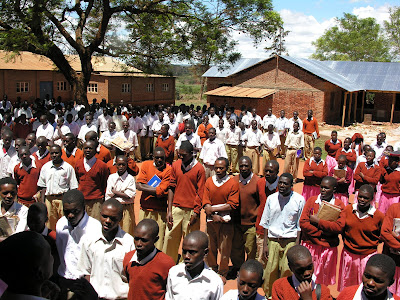Wednesday, May 27, 2009
Solar Cooking
Kising'a has no electricity so all cooking must be done over wood fires. Women must spend a lot of time gathering wood and then work over a smokey fire, often with a small child on their back breathing the smoke. We are bringing a couple solar cookers to the village on this trip that are made right here in the Twin Cities at the Solar Oven Society. We used them to cook rice, potatoes, and carrots and they work great. They cook at lower temperatures (> 200F) and are kind of like a solar crock pot that does not have to be watched. They can also be used to pasteurize water and we are bringing 100 Water Pasteurization Indicators to tell when the water is safe. WAPI are a reusable tube with a wax plug that melts at 65 C (150 F) which is hot enough to kill all bacteria. Not having to heat to a full boil cuts the energy usage in half. We will be staying with our friends in Kising'a for four nights and will have fun using these things with them and learning how well they work and what they think of them. They treat us as special guests but hopefully this time they will let us help with the cooking.
Friday, May 15, 2009
Kising'a Time
Kising'a is 8 or 9 hours ahead of us depending on where we are with daylight savings time. Near the equator every day is about 12 hours long all year with the sun setting around 6 PM so they do not need to shift their clocks. In a village with no electricity, this means the only light in the evening is a dim and smelly kerosene lamp which is very hard to study or even eat by. Because the sun always rises around 6 in the morning and sets around 6 in the evening, Swahili time starts the day at our 6 AM and calls that 12. If you ask a Tanzanian what time the store opens, they might say moja, one in Swahili, meaning that the store opens at 1 AM which is 7 AM to us (This really happened to me). This kind of makes sense since the daylight counts hours from 1 to 12. Their clocks are positioned like ours but they read the opposite end of the hour hand to get the current hour. Generally, if they tell you the time in English, it will be our time and in Swahili, it will be Tanzania time. It definitely makes you pause sometimes, but fortunately, they know how we count time and usually use that for us.
Sunday, May 10, 2009
Kising'a Secondary School
Kising'a now has it's own Secondary school which started with students in Form I in 2006. The new school is run by Village Schools and accepts all new primary school graduates. Having a school right in Kising'a means that students can live at home with their families. Kising'a Secondary is adding a grade level each year and now has Forms I - III. Secondary students can graduate after form IV with a type O diploma or continue to Form VI for a type A diploma. Part of our mission on this trip is to bring materials for conducting Physics and Chemistry experiments. Teachers from two other VSI schools will be coming to Kising'a with us and we will hold a 1 day workshop with them and the Kising'a students where we will demonstrate many of the experiments with the teachers. Science is a difficult subject to teach and make interesting in Tanzania because of the lack of resources and cursory textbooks. This is a self perpetuating problem because few students specialize in science and often science will be taught by non majors. We hope to learn with this experiment of experiments how this can be improved and expand to other VST and Diocese schools. You can see what we are bringing and the Tanzania ciriculum topics at our web page.
Sponsored students with Pastor Wihale at Kising'a Secondary School
Secondary Education
Attending secondary school is a privilege in Tanzania. Only 5-10 % of children that complete primary school continue because space is very limited and student fees are prohibitive for most families. Pastor Wihale tells us that student scholarships for education are the most important thing we can do to help them. We have supported many students over the years of our partnership. One early student, Elias, is graduating from Tumaini seminary this year. Another graduate is attending university in Dar and a third is headmaster at a school south of Kising'a. Most of the students we have supported have attended boarding schools run by the Lutheran Diocese. The language of instruction in Primary School is Swahili but in Secondary school it is English. Students must study in English as they learn the language.
Students at Pomerin Diocese School - Jan 2006
Students at Pomerin Diocese School - Jan 2006
Saturday, May 9, 2009
Anniversary
2009 is the 10 year anniversary of Lutheran Church of Peace's partnership with Kising'a and in June a group from LCP will be travelling to Kising'a to celebrate with our friends in Kising'a parish. Several people from the June 2007 trip will be returning on this trip. This blog will tell about Kising'a and post updates during our trip.
Kising'a Parish welcoming us June 2007
Subscribe to:
Comments (Atom)


